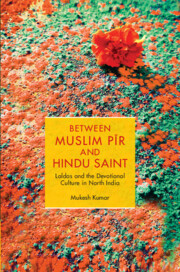Book contents
- Frontmatter
- Dedication
- Contents
- List of Figures, Maps and Tables
- Acknowledgements
- List of Abbreviations
- A Note on Transliteration
- Maps
- 1 The Spectre of Binaries
- 2 Laldas and Religious Duality of Pīr and Sant
- 3 The Laldas Shrines and Inter-religious Disputes
- 4 A Fait Accompli: The Complete Hinduisation of the Laldas Order
- 5 Religious Reform and Shared Shrines
- 6 Concealment and Secrecy: Hidden in Plain Sight
- 7 Poetic Response to Religious Puritanism
- 8 An Ephemeral Line in the Sand
- Appendices
- Glossary
- Bibliography
- Index
6 - Concealment and Secrecy: Hidden in Plain Sight
Published online by Cambridge University Press: 30 April 2024
- Frontmatter
- Dedication
- Contents
- List of Figures, Maps and Tables
- Acknowledgements
- List of Abbreviations
- A Note on Transliteration
- Maps
- 1 The Spectre of Binaries
- 2 Laldas and Religious Duality of Pīr and Sant
- 3 The Laldas Shrines and Inter-religious Disputes
- 4 A Fait Accompli: The Complete Hinduisation of the Laldas Order
- 5 Religious Reform and Shared Shrines
- 6 Concealment and Secrecy: Hidden in Plain Sight
- 7 Poetic Response to Religious Puritanism
- 8 An Ephemeral Line in the Sand
- Appendices
- Glossary
- Bibliography
- Index
Summary
He who hid well, lived well. (René Descartes)
Wherever there is power, there is secrecy. (Taussig 1999)
How did devout followers of a saint respond when a dominant reform organisation deemed their beliefs and ritual practices as impure? Did they abandon all the ‘impure’ beliefs, or did they find ways to navigate the influence and power of the reformist ideology? In such circumstances, faith begins to operate through acts of concealment and secrecy, which become potent tools for managing societal and religious pressures. Some of these practices of concealment/secrecy among the Muslims of Mewat ran afoul of the puritanical Tablighi Jamaat, which discouraged the veneration of saints as bidat (innovation/heresy) and shirk (polytheism), considering them as antithetical to Islam. Concealment and secrecy practices represent a significant form of social knowledge that helps sustain social institutions and human relationships (Simmel 1906).
Fluidity across religious boundaries between ‘Hinduism’ and ‘Islam’ is not a new idea; it has been analysed in a large number of scholarly works (Amin 2016; Assayag 2004; Bigelow 2010; Flueckiger 2006; Gilmartin and Lawrence 2000; Gottschalk 2000; D. Khan 2004a; Mayaram 1997a). While these works effectively display the flexibility of religious boundaries, they fail to delve into the implications when reformist groups arise and promote the notion of a rigid, uniform and pure religious boundary. In Mewat, as in other parts of India, reformist groups strongly emphasised the segregation of religious communities based on their identities and ritual practices. However, little attention has been given to the phenomenon of resistance to, or passive negotiation with, these powerful reformist forces that oppose religious blending.
Many Meo and non-Meo Muslims, mostly women, still venerate these saints, although they conceal their devotion to evade the wrath of Meo men and other Tablighis. Their stories of concealment reveal intricate processes of contestation and accommodation between the Sufi and Tablighi Jamaat ideologies, the divergent beliefs of male and female in a family, and different dynamics of the relationships between the powerful and the powerless. To operate effectively, secrecy as a type of societal knowledge relies on three essential elements: individual actors who engage in concealment; an audience, from whom the secret is concealed; and a power structure that the secret undermines or challenges.
- Type
- Chapter
- Information
- Between Muslim Pīr and Hindu SaintLaldas and the Devotional Culture in North India, pp. 162 - 186Publisher: Cambridge University PressPrint publication year: 2024
- Creative Commons
- This content is Open Access and distributed under the terms of the Creative Commons Attribution licence CC-BY-NC 4.0 https://creativecommons.org/cclicenses/

